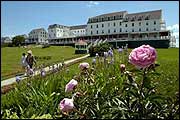Star Island reopens after unexpected closure
Popular N.H. summer conference center cleared by fire chief; executive director resigns.
In the wake of the closure, Star Island Corporation executive director Amy Lockwood resigned her post as of August 3, citing personal reasons. Her resignation was accepted by the Star Island board.
The closure meant that Star Island missed its June 16 opening date. However, the center was cleared on July 18 by the Rye Fire Department for a July 22 opening, and staff scurried to get ready for guests. In the absence of the regularly scheduled conferences, Star Island is open to people who wish to enjoy a personal retreat until August 5, when the first conference will begin.
In 2002 the Star Island Corporation and local and state fire officials created a written fire safety improvement plan for the conference center. There are many historic buildings on the island, including a church built in 1800 and the Oceanic Hotel, constructed in the 1870s. “We’ve been working on the upgrades over the past five years,” said Lockwood. “We had done most, but some of the electrical systems still needed upgrading.” When the fire chief inspected the island in June, he insisted that some of those repairs be completed before the start of the season. The island immediately hired an electrical engineering consultant to oversee the required work.
Two of the season’s first conferences were moved to the Ferry Beach Camp and Conference Center in Saco, Maine. “The Ferry Beach staff opened their doors to the conferences, and they were able to pull everything together,” Lockwood said.
The Rev. Brad Greeley, president of the Star Island Corporation, said that a committee had been formed to examine the process that led to the closure, and it will be submitting a progress report to the board in August. Star Island Corporation was set up in 1916 and is affiliated with both the Unitarian Universalist Association of Congregations and the United Church of Christ.
Since Star Island relies on room and board funds to support well over half of its annual budget, the unexpected lack of income has hurt it significantly, said Deborah Weiner, a former board member and the UUA's Director of Electronic Communications. The budget is created based on a more than 90 percent annual occupancy rate. According to Greeley, the lost revenue is around $1 million.
The reasons for the island’s closure are complex. “This is a nonprofit that has been operating very close to the edge out of its commitment to provide affordable family vacations and retreats,” Weiner said. “The budget has not been able to adequately fund maintenance expenses for many years.” One of the reasons, she said, was the significant costs related to operating the island’s historic buildings in a remote seacoast environment—an annual challenge made more difficult when the winters bring Nor’easters to the coast.
Conference goers, called Shoalers, had been stricken by the closure. Many conferees have been Star Island regulars for many years. Weiner, 55, reports that she has gone to Star for 53 summers. Her husband, Ben Soule, 56, has been there for more than 45 years. They, according to Weiner, are not unusual. “Sometimes there are three and four generations of families together,” she said. “It’s one of the elements which, when added to the unspeakable beauty of the island, makes it a remarkable place that must be protected and preserved.”
In the meantime, new energy is being directed toward fundraising. “We are getting a loan from our endowment fund,” Greeley said. “We’re also embarking on an emergency fundraising campaign.”
In a press release, Greeley thanked and praised Lockwood for her work as executive director. Dave Boynton, a member of Star Island’s board, will serve as acting executive director until an interim executive director can be found.
Star Island is the second largest of the nine Isles of Shoals spread out along the New Hampshire-Maine border, seven miles from shore. Star is officially part of New Hampshire, although five of the islands belong to Maine. The island received its name from fishermen in the early seventeenth century because the island’s “points stretch out in all directions like flashes of a distant star,” according to the conference center’s website. Known first as a rich fishing grounds, the Isles sustained a fishing industry until the mid-nineteenth century, when tourism gained a foothold.
In 1897, the “conference era” began when Thomas Elliott, a Unitarian from Lowell, Mass., went to Star instead of to his district’s regular Unitarian meeting place on Lake Winnipesaukee in New Hampshire. He was so impressed by the island—and knowing that the island could use the business—that he started a letter writing campaign to bring religious conferences there. As word spread, the island became popular among Congregationalists as well as Unitarians.
In 1916, the island was purchased by the newly formed Star Island Corporation, responsible for managing and maintaining the property. The board consisted of six Unitarians and three Congregationalists, and continues to include representatives from both denominations today. The conference center is open to anyone.
The beauty and spirit of the islands keeps people coming back despite conditions that are best described as rustic. Showers are limited to two per week, bathrooms are mostly shared, and there are restrictions on electricity use. It is not unusual for rooms to come equipped with a pitcher and basin. But dedicated Shoalers are undaunted. “The beauty of the sunrises and the sunsets is priceless,” Weiner said. “Besides, everyone else is in the same boat.”
See sidebar for links to related resources.








